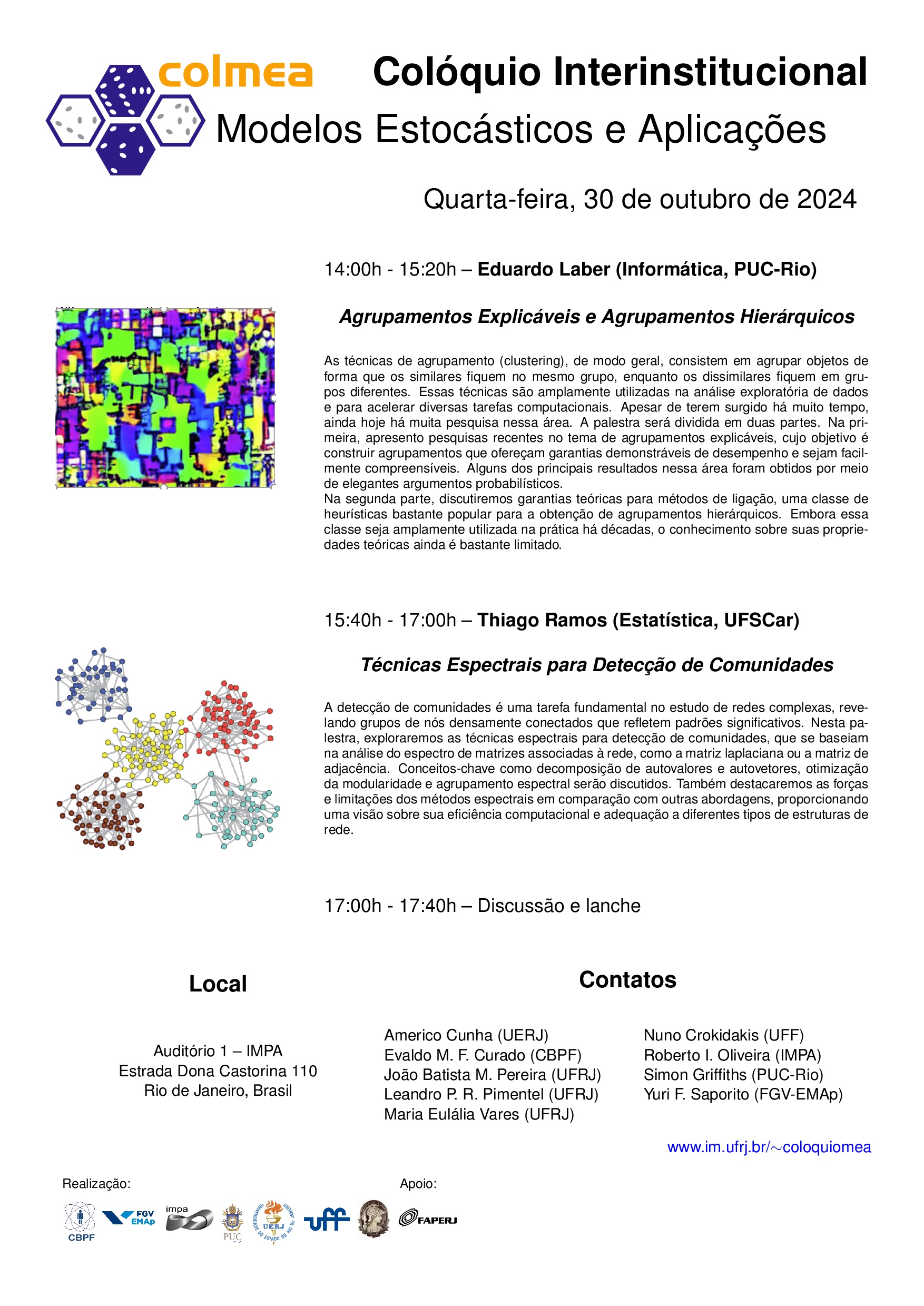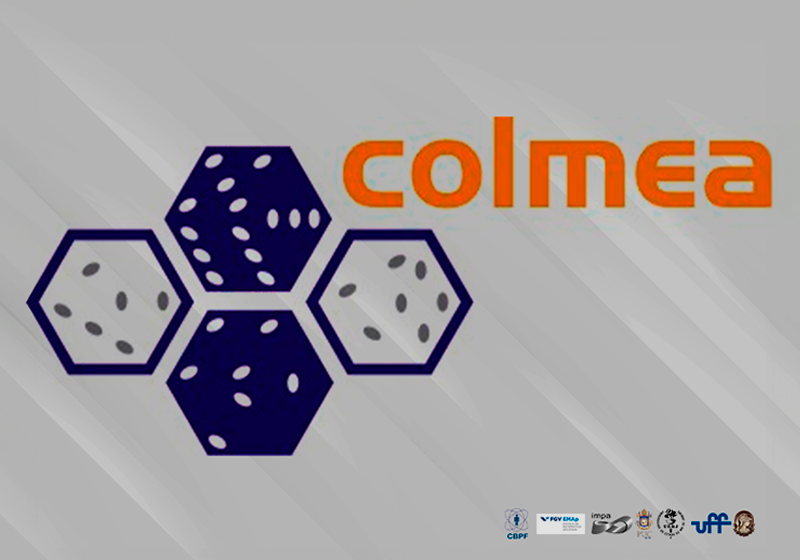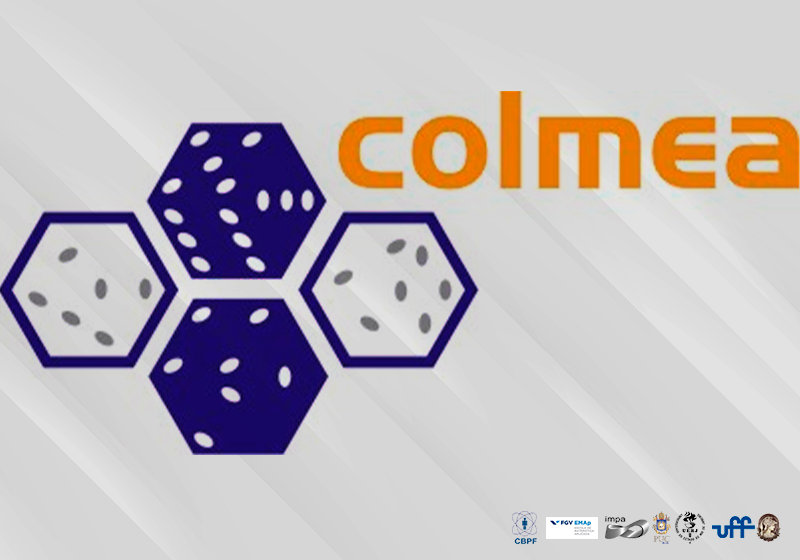
Informações completas sobre o COLMEA podem ser encontradas em: https://www.im.ufrj.br/coloquiomea/ .
 O COLMEA - Colóquio Interinstitucional Modelos Estocásticos e Aplicações - Dia 31 de janeiro de 2024, a partir das 14:00h, no IM-UFRJ, Sala C-116. Será o primeiro encontro deste novo ano e aproveitamos para desejar a todos um Feliz 2024. Nesta ocasião teremos as palestras dos Professores Helcio Orlande (Programa de Engenharia Matemática - COPPE/UFRJ) e Béla Bollobás (University of Cambridge e University of Memphis)
O COLMEA - Colóquio Interinstitucional Modelos Estocásticos e Aplicações - Dia 31 de janeiro de 2024, a partir das 14:00h, no IM-UFRJ, Sala C-116. Será o primeiro encontro deste novo ano e aproveitamos para desejar a todos um Feliz 2024. Nesta ocasião teremos as palestras dos Professores Helcio Orlande (Programa de Engenharia Matemática - COPPE/UFRJ) e Béla Bollobás (University of Cambridge e University of Memphis)
Programa:
14:00 - 15:20 Helcio Orlande (PEM COPPE/UFRJ) - State estimation and predictive control applied to the treatment of the hypoxic-ischemic encephalopathy in neonates
15:40 - 17:00 Béla Bollobás (Univ. of Cambridge and Univ. of Memphis) - Sum-set problems and results -- Old and new
17:00 - Discussão e lanche
Local: Sala C-116
Informações mais completas sobre o COLMEA podem ser encontradas AQUI!
Atenciosamente,
O comitê organizador:
Americo Cunha (UERJ)
Evaldo M.F. Curado (CBPF)
João Batista M. Pereira (UFRJ)
Leandro P. R. Pimentel (UFRJ)
Maria Eulalia Vares (UFRJ)
Nuno Crokidakis (UFF)
Roberto I. Oliveira (IMPA)
Simon Griffiths (PUC-Rio)
Yuri F. Saporito (FGV-EMAp)
State estimation and predictive control applied to the treatment of the hypoxic-ischemic encephalopathy in neonates - Helcio R. B. Orlande (Programa de Engenharia Mecânica, COPPE-UFRJ)
The hypoxic-ischemic encephalopathy in neonates is a neurological disorder characterized by the lack of oxygen (hypoxia) and low blood flow (ischemia), often related to perinatal asphyxia due to complications during birth. The main treatment for hypoxic-ischemic encephalopathy in neonates is the cooling of affected regions. Systemic cooling can be achieved by wrapping the body of the neonate with a blanket containing channels through which cold water is circulated. Alternatively, local cooling can be performed by surrounding the head of the neonate with a cap, in which cold water flows through channels, while the remaining body can be warmed by a radiator in the incubator. This seminar summarizes the works recently performed by the authors on the solution of inverse problems and predictive control related to the hypothermia treatment of the hypoxic-ischemic encephalopathy in neonates. The inverse problem involved the estimation of the brain temperature from the information provided by other temperature measurements available during the treatment. The inverse problem was solved as a state estimation problem with the Sampling Importance Resampling (SIR) algorithm of the particle filter method. The solution of the inverse problem was verified with simulated measurements, and ultimately validated with actual experimental data obtained during the local cooling treatment of a neonate in a pediatric intensive care unit. The combined application of the particle filter method and stochastic model predictive control was also numerically examined, in order to observe and control the body temperatures during the cooling treatment of a neonate.
Sum-set problems and results -- Old and new - Béla Bollobás (University of Cambridge and University of Memphis)
Sums of subsets of R^n, Z^n and Z_p^n have been studied for well over a century, although at the beginning progress was very slow. The subject took off in the 1960s, when Erdos and Heilbronn, and Freimann published their celebrated papers, and has been going from strength to strength with the results of Gowers, Green, Károlyi, Ruzsa, Tao, Vu and others. The talk, which should be understandable to a wide audience, not only to pure mathematicians, will contain some of the results I have obtained with Imre Leader and Marius Tiba, together with a recent breakthrough achieved by Gowers, Green, Manners and Tao.
 O COLMEA - Colóquio Interinstitucional Modelos Estocásticos e Aplicações - Dia 03 de abril de 2024, a partir das 14:00h, no IM-UFRJ, Sala C-116.
O COLMEA - Colóquio Interinstitucional Modelos Estocásticos e Aplicações - Dia 03 de abril de 2024, a partir das 14:00h, no IM-UFRJ, Sala C-116.
Programa:
14:00 - 15:20 Renata Libonati (IGEO-UFRJ) - Eventos compostos Secas-Ondas de Calor-Incêndios: Estamos preparados?
15:40 - 17:00 Kelly C. Mota Gonçalves (IM-UFRJ) - Mapeamento de indicadores usando estimação em pequenos domínios.
17:00 - 18:00 Discussão e lanche
Local: Sala C-116
Informações mais completas sobre o COLMEA podem ser encontradas AQUI!
 Data: 22/11/2023
Data: 22/11/2023
Horário: a partir das 14:00h
Local: Sala de reuniões do Decanato do CTC, 12 º andar do prédio Cardeal Leme, PUC-Rio
Nesta ocasião teremos palestras de Philip Thompson (FGV EMAp) e Oliver Riordan (Oxford).
Programa:
14:00 h - 15:20h - Philip Thompson (FGV EMAp)
Outlier-robust additive matrix decomposition and robust matrix completion
Abstract: We study least-squares trace regression when the parameter is the sum of a $r$-low-rank matrix with a $s$-sparse matrix and a fraction $\epsilon$ of the labels is corrupted. For subgaussian distributions, we highlight three needed design properties, each one derived from a different process inequality: the ``product process inequality'', ``Chevet's inequality'' and the ``multiplier process inequality''. Jointly, these properties entail the near-optimality of a tractable estimator with respect to the effective dimensions for the low-rank and sparse components, $\epsilon$ and the failure probability $\delta$. ... Our estimator is adaptive to $(s,r,\epsilon,\delta)$ and, for fixed absolute constant $c>0$, it attains the mentioned rate with probability $1-\delta$ uniformly over all $\delta > exp(-cn)$. Disconsidering matrix decomposition, our analysis also entails optimal bounds for a robust estimator adapted to the noise variance. Finally, we consider robust matrix completion. We highlight a new property for this problem: one can robustly and optimally estimate the incomplete matrix regardless of the magnitude of the corruption. Our estimators are based on ``sorted'' versions of Huber's loss. We present simulations matching the theory. In particular, it reveals the superiority of ``sorted'' Huber's losses over the classical Huber's loss.
15:40h - 17:00h - Oliver Riordan (Oxford)
The chromatic number of random graphs
17:00h - Discussão e lanche
Todos são muito bem-vindos.
Informações mais completas sobre o COLMEA podem ser encontradas AQUI.
O comitê organizador:
Americo Cunha (UERJ)
Evaldo M.F. Curado (CBPF)
João Batista M. Pereira (UFRJ)
Leandro P. R. Pimentel (UFRJ)
Maria Eulalia Vares (UFRJ)
Nuno Crokidakis (UFF)
Roberto I. Oliveira (IMPA)
Simon Griffiths (PUC-Rio)
Yuri F. Saporito (FGV-EMAp)

